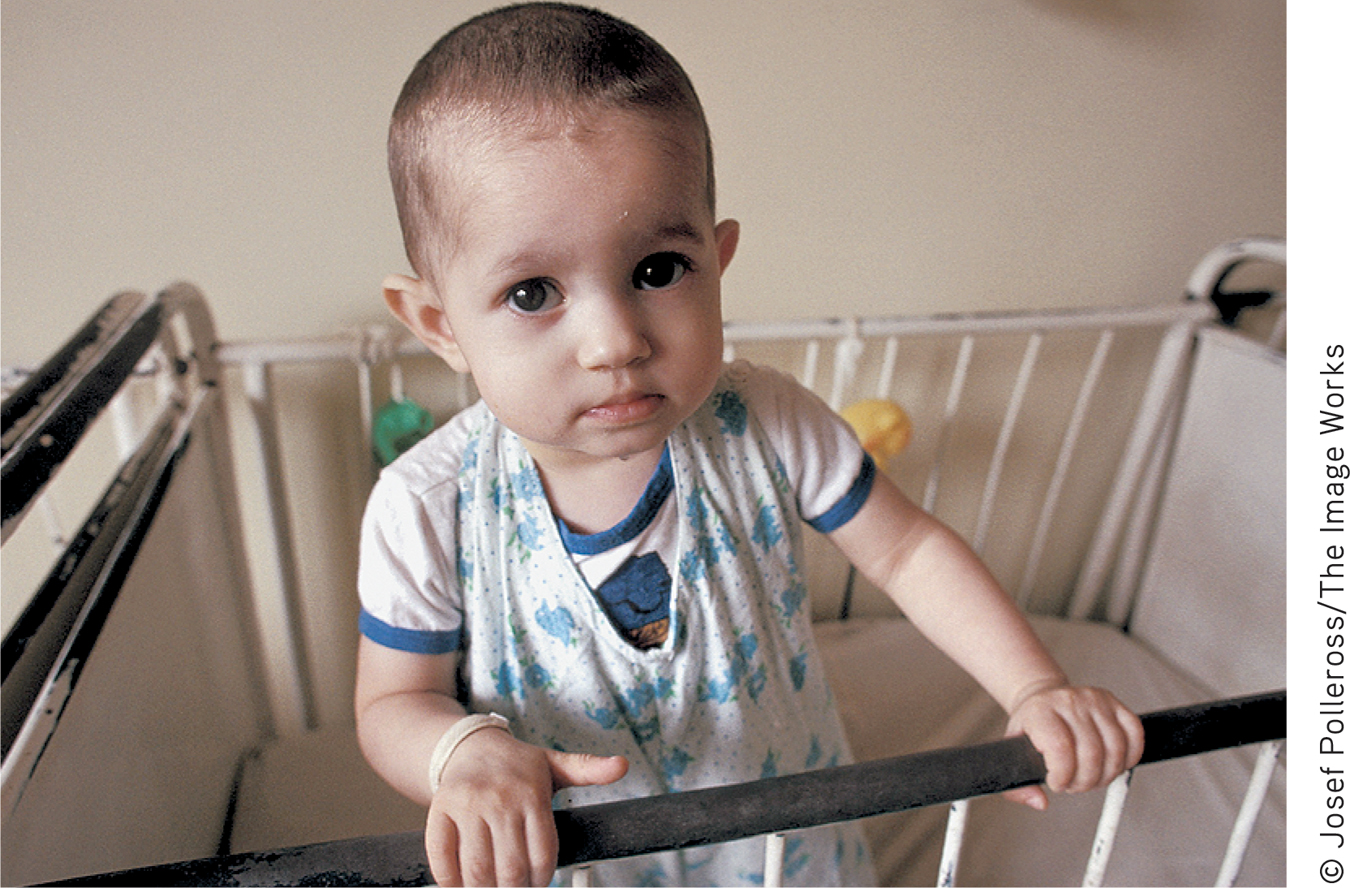Early Environmental Influences
Nowhere is the intertwining of biology and experience more apparent than in the most hopeless human environments, such as J. McVicker Hunt (1982) observed in a destitute Iranian orphanage. The typical child Hunt observed there could not sit up unassisted at age 2 or walk at age 4. The little care the infants received was not in response to their crying, cooing, or other behaviors, so the children developed little sense of personal control over their environment. They were instead becoming passive “glum lumps.” Extreme deprivation was bludgeoning native intelligence—a finding confirmed by studies of children raised in poorly run orphanages in Romania and elsewhere (Nelson et al., 2009, 2013; van IJzendoorn et al., 2008).
Aware of both the dramatic effects of early experiences and the impact of early intervention, Hunt began a training program of tutored human enrichment for the Iranian caregivers, teaching them to play language-fostering games with 11 infants. They imitated the babies’ babbling, engaged them in vocal follow-the-leader, and, finally, they taught the infants sounds from the Persian language. The results were dramatic. By 22 months of age, the infants could name more than 50 objects and body parts, and so charmed visitors that most were adopted—an unprecedented success for the orphanage.
Hunt’s findings are an extreme case of a more general finding: Poor environmental conditions can depress cognitive development. Schools with many poverty-level children often have less-qualified teachers, as one study of 1450 Virginia schools found, which has predicted lower achievement scores (Tuerk, 2005).
Poverty-related stresses also impede cognitive performance. Like a computer that slows when running multiple operations, impoverished people’s worries and distractions consume cognitive bandwidth and can diminish their thinking capacity. For example, on tests of cognitive functioning, sugar cane farmers in India scored better after being paid for their harvest, when their money worries dropped (Mani et al., 2013). Poverty can deplete cognitive capacity.
Malnutrition also plays a role. Relieve infant malnutrition with nutritional supplements, and poverty’s effect on physical and cognitive development lessens (Brown & Pollitt, 1996).
Page 409
So, extreme conditions—malnutrition, sensory deprivation, and social isolation—can retard normal brain development. Is the reverse also true? Will an “enriched” environment give children a superior intellect? Most experts are doubtful (Bruer, 1999; DeLoache et al., 2010; Reichert et al., 2010). There is no environmental recipe for fast-forwarding a normal infant into a genius. All babies should have normal exposure to sights, sounds, and speech. Although preschool experiences matter, Sandra Scarr’s (1984) verdict still is widely shared: “Parents who are very concerned about providing special educational lessons for their babies are wasting their time.”
Schooling and Intelligence
Later in childhood, schooling is one intervention that pays intelligence score dividends. Schooling and intelligence interact, and both enhance later income (Ceci & Williams, 1997, 2009). Hunt was a strong believer in the ability of education to boost children’s chances for success by developing their cognitive and social skills. Indeed, his 1961 book, Intelligence and Experience, helped launch Project Head Start in 1965, a U.S. government-funded preschool program that has served more than 30 million children, most of whom come from families below the poverty level (Head Start, 2013). Does it succeed? Studies suggest that Head Start increases school readiness and gives a modest boost to later health and high school completion rate (Deming, 2009; Mervis, 2011a; Pianta et al., 2009). Generally, however, aptitude benefits fade out over time (reminding us that life experiences after Head Start matter, too).
Encouraging results come from intensive, high-quality preschool programs (Mervis, 2011a; Tucker-Drob, 2012). Across a number of experiments, intelligence scores also rise with nutritional supplements to pregnant mothers and newborns (3.5 points), with quality preschool experiences (4 points), and with interactive reading programs (6 points) (Protzko et al., 2013).
Genes and experience together weave the fabric of intelligence. (Epigenetics is one field that studies this nature-nurture meeting place.) But what we accomplish with our intelligence depends also on our own beliefs and motivation. One analysis of 72,431 collegians found that study motivation and study skills rivaled aptitude and previous grades as predictors of academic achievement (Credé & Kuncel, 2008). Motivation can even affect intelligence test performance. Four dozen studies show that, when promised money for doing well, adolescents score higher on such tests (Duckworth et al., 2011).
These observations lend support to research by psychologist Carol Dweck (2006, 2012a,b). She reports that believing intelligence is changeable, not fixed, can foster a growth mind-set, which focuses on learning and growing. As collegians, these believers also tend to happily flourish (Howell, 2009). Dweck has developed interventions that effectively teach young teens that the brain is like a muscle; it grows stronger with use as neuron connections grow. Praising children’s effort rather than their ability encourages their growth mind-set and their attributing success to hard work (Gunderson et al., 2013). Fostering a growth mind-set also makes teens more resilient when others frustrate them (Yeager et al., 2013, 2014). Indeed, superior achievements in fields from sports to science to music arise from the combination of ability, opportunity, and disciplined effort (Ericsson et al., 2007; Subotnik et al., 2011).
“It is our choices … that show what we truly are, far more than our abilities.”
Professor Dumbledore to Harry Potter in J. K. Rowling’s Harry Potter and the Chamber of Secrets, 1999
Real world studies confirm that ability + opportunity + motivation = success. High school students’ math proficiency and college students’ grades reflect their aptitude but also their self-discipline, their belief in the power of effort, and a curious, “hungry mind” (Murayama et al., 2013; Richardson et al., 2012; von Stumm et al., 2011). Indian-Americans won all seven national spelling bee contests between 2008 and 2014, an achievement likely influenced by a cultural belief that strong effort will meet with success (Rattan et al., 2012).
Page 410
